Residential Tenancies Act: A Business Law Case Study Analysis
VerifiedAdded on 2023/05/30
|5
|1115
|479
Case Study
AI Summary
This case study analyzes several scenarios related to the Residential Tenancies Act, focusing on the rights and responsibilities of landlords and tenants. The first case examines the eviction process for non-payment of rent, referencing sections 21 and 29 of the Act and outlining the obligations of both the landlord (Melissa) and the tenant (David). The second case discusses property damage and cleanliness, referencing section 33, and determines the appropriate amount of money Mr. Bob should retain from Mr. Justine. The third case concerns housing standards and safety, particularly regarding a faulty heater, placing responsibility on the landlord (Sophia) for maintenance and tenant compensation. The final case emphasizes the importance of clear communication and inspection reports to avoid disputes over property maintenance and repairs, highlighting the landlord's responsibility to maintain the rental unit. The study uses various sections of the Residential Tenancies Act 2006 and Ministerial Regulations as legal references.
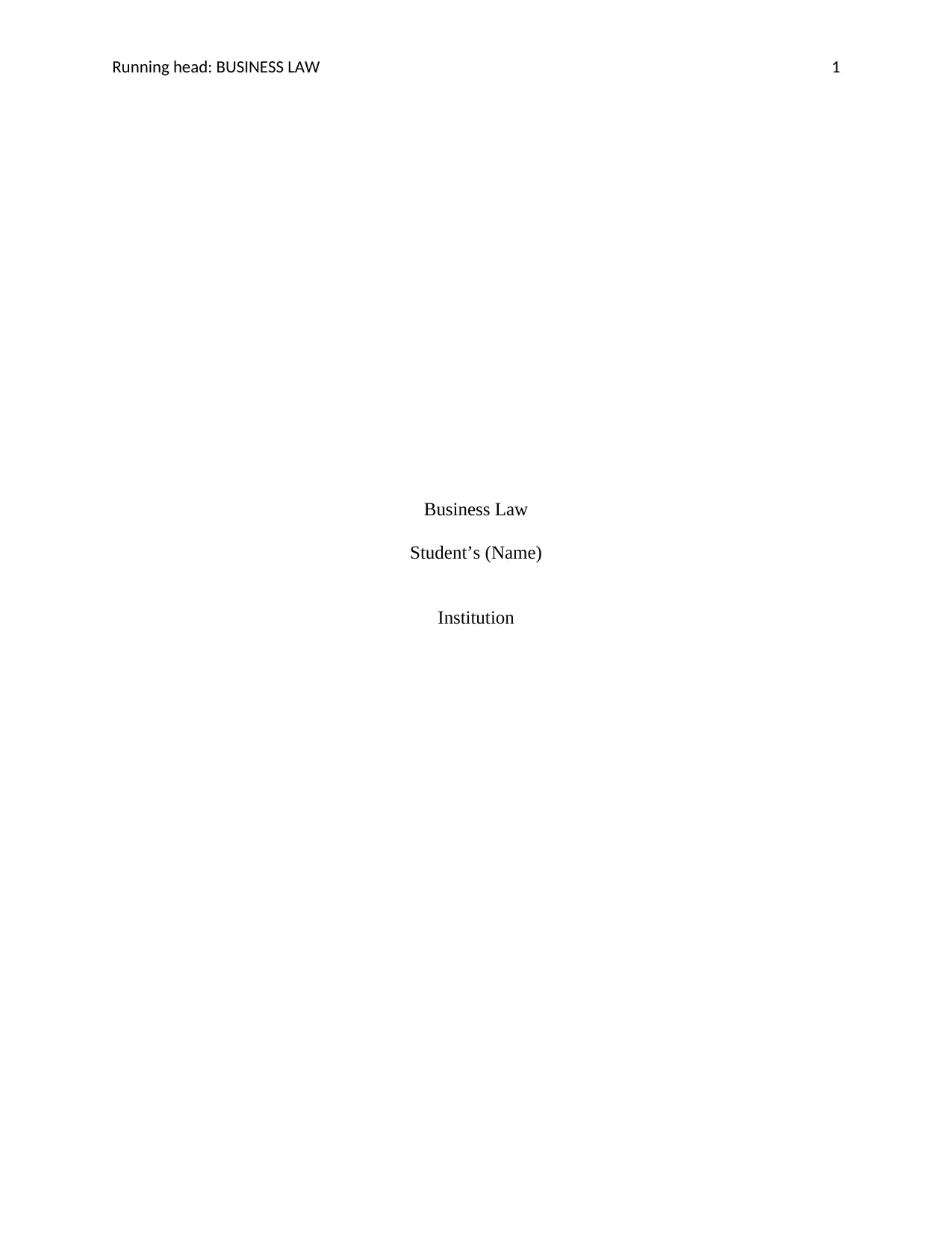
Running head: BUSINESS LAW 1
Business Law
Student’s (Name)
Institution
Business Law
Student’s (Name)
Institution
Paraphrase This Document
Need a fresh take? Get an instant paraphrase of this document with our AI Paraphraser
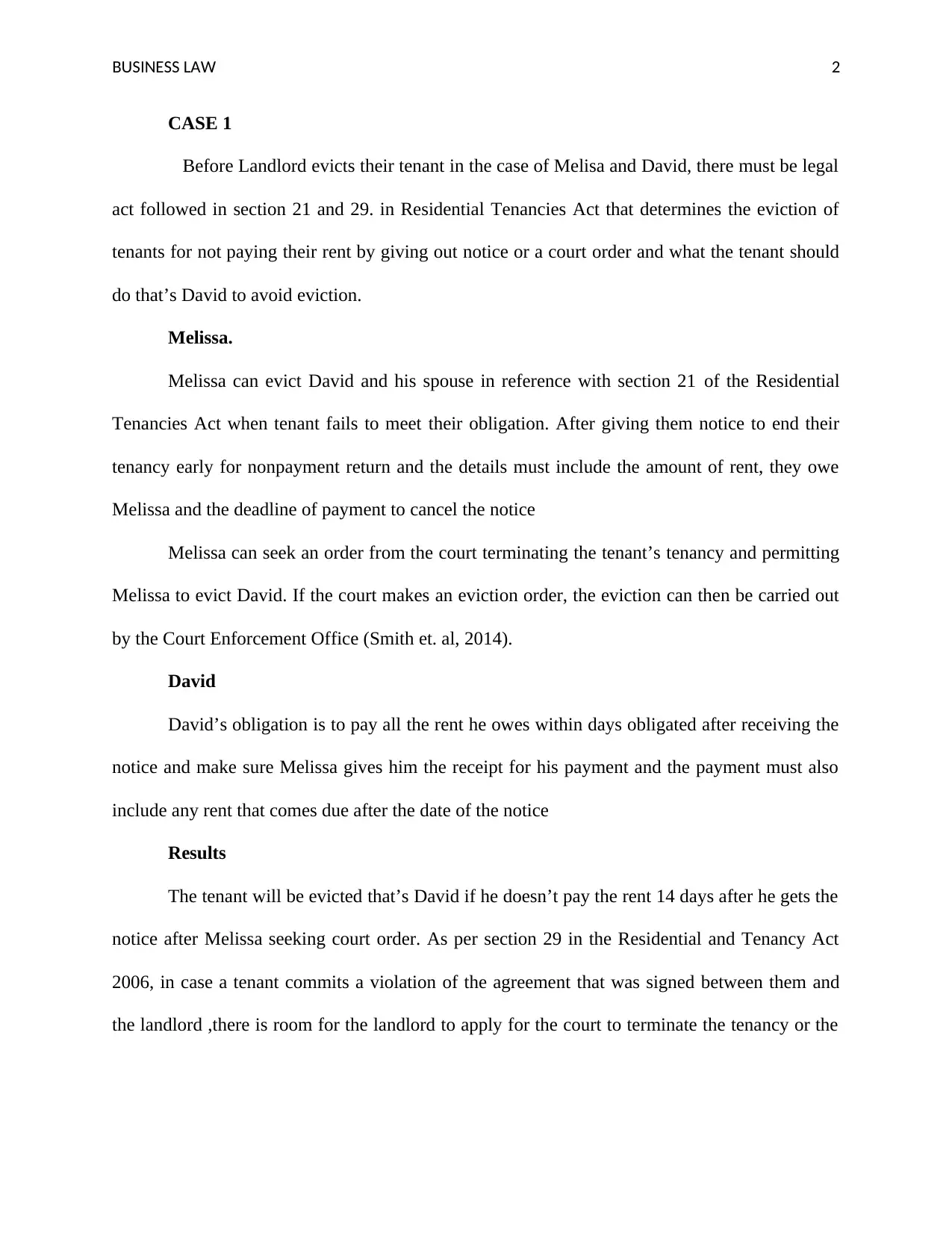
BUSINESS LAW 2
CASE 1
Before Landlord evicts their tenant in the case of Melisa and David, there must be legal
act followed in section 21 and 29. in Residential Tenancies Act that determines the eviction of
tenants for not paying their rent by giving out notice or a court order and what the tenant should
do that’s David to avoid eviction.
Melissa.
Melissa can evict David and his spouse in reference with section 21 of the Residential
Tenancies Act when tenant fails to meet their obligation. After giving them notice to end their
tenancy early for nonpayment return and the details must include the amount of rent, they owe
Melissa and the deadline of payment to cancel the notice
Melissa can seek an order from the court terminating the tenant’s tenancy and permitting
Melissa to evict David. If the court makes an eviction order, the eviction can then be carried out
by the Court Enforcement Office (Smith et. al, 2014).
David
David’s obligation is to pay all the rent he owes within days obligated after receiving the
notice and make sure Melissa gives him the receipt for his payment and the payment must also
include any rent that comes due after the date of the notice
Results
The tenant will be evicted that’s David if he doesn’t pay the rent 14 days after he gets the
notice after Melissa seeking court order. As per section 29 in the Residential and Tenancy Act
2006, in case a tenant commits a violation of the agreement that was signed between them and
the landlord ,there is room for the landlord to apply for the court to terminate the tenancy or the
CASE 1
Before Landlord evicts their tenant in the case of Melisa and David, there must be legal
act followed in section 21 and 29. in Residential Tenancies Act that determines the eviction of
tenants for not paying their rent by giving out notice or a court order and what the tenant should
do that’s David to avoid eviction.
Melissa.
Melissa can evict David and his spouse in reference with section 21 of the Residential
Tenancies Act when tenant fails to meet their obligation. After giving them notice to end their
tenancy early for nonpayment return and the details must include the amount of rent, they owe
Melissa and the deadline of payment to cancel the notice
Melissa can seek an order from the court terminating the tenant’s tenancy and permitting
Melissa to evict David. If the court makes an eviction order, the eviction can then be carried out
by the Court Enforcement Office (Smith et. al, 2014).
David
David’s obligation is to pay all the rent he owes within days obligated after receiving the
notice and make sure Melissa gives him the receipt for his payment and the payment must also
include any rent that comes due after the date of the notice
Results
The tenant will be evicted that’s David if he doesn’t pay the rent 14 days after he gets the
notice after Melissa seeking court order. As per section 29 in the Residential and Tenancy Act
2006, in case a tenant commits a violation of the agreement that was signed between them and
the landlord ,there is room for the landlord to apply for the court to terminate the tenancy or the
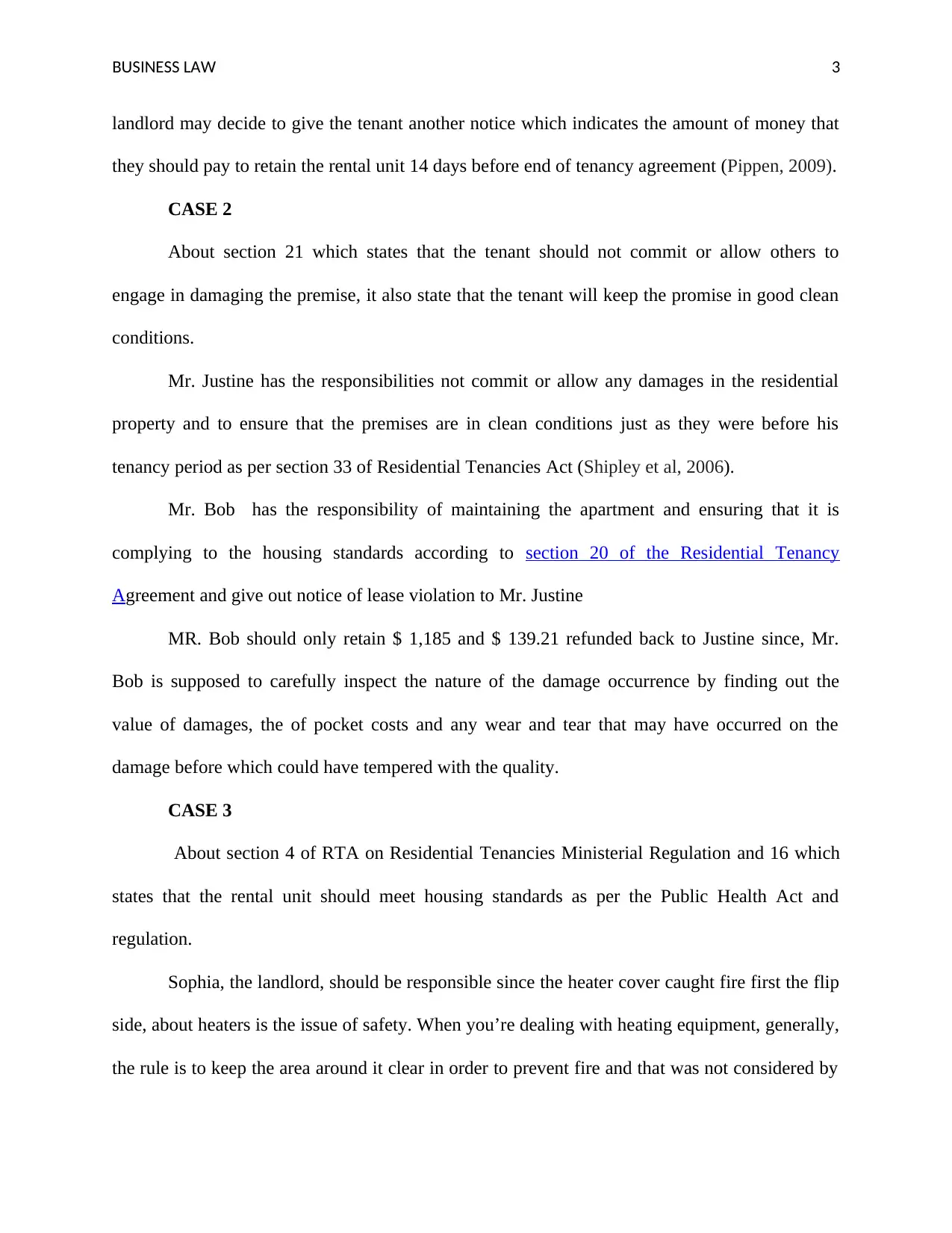
BUSINESS LAW 3
landlord may decide to give the tenant another notice which indicates the amount of money that
they should pay to retain the rental unit 14 days before end of tenancy agreement (Pippen, 2009).
CASE 2
About section 21 which states that the tenant should not commit or allow others to
engage in damaging the premise, it also state that the tenant will keep the promise in good clean
conditions.
Mr. Justine has the responsibilities not commit or allow any damages in the residential
property and to ensure that the premises are in clean conditions just as they were before his
tenancy period as per section 33 of Residential Tenancies Act (Shipley et al, 2006).
Mr. Bob has the responsibility of maintaining the apartment and ensuring that it is
complying to the housing standards according to section 20 of the Residential Tenancy
Agreement and give out notice of lease violation to Mr. Justine
MR. Bob should only retain $ 1,185 and $ 139.21 refunded back to Justine since, Mr.
Bob is supposed to carefully inspect the nature of the damage occurrence by finding out the
value of damages, the of pocket costs and any wear and tear that may have occurred on the
damage before which could have tempered with the quality.
CASE 3
About section 4 of RTA on Residential Tenancies Ministerial Regulation and 16 which
states that the rental unit should meet housing standards as per the Public Health Act and
regulation.
Sophia, the landlord, should be responsible since the heater cover caught fire first the flip
side, about heaters is the issue of safety. When you’re dealing with heating equipment, generally,
the rule is to keep the area around it clear in order to prevent fire and that was not considered by
landlord may decide to give the tenant another notice which indicates the amount of money that
they should pay to retain the rental unit 14 days before end of tenancy agreement (Pippen, 2009).
CASE 2
About section 21 which states that the tenant should not commit or allow others to
engage in damaging the premise, it also state that the tenant will keep the promise in good clean
conditions.
Mr. Justine has the responsibilities not commit or allow any damages in the residential
property and to ensure that the premises are in clean conditions just as they were before his
tenancy period as per section 33 of Residential Tenancies Act (Shipley et al, 2006).
Mr. Bob has the responsibility of maintaining the apartment and ensuring that it is
complying to the housing standards according to section 20 of the Residential Tenancy
Agreement and give out notice of lease violation to Mr. Justine
MR. Bob should only retain $ 1,185 and $ 139.21 refunded back to Justine since, Mr.
Bob is supposed to carefully inspect the nature of the damage occurrence by finding out the
value of damages, the of pocket costs and any wear and tear that may have occurred on the
damage before which could have tempered with the quality.
CASE 3
About section 4 of RTA on Residential Tenancies Ministerial Regulation and 16 which
states that the rental unit should meet housing standards as per the Public Health Act and
regulation.
Sophia, the landlord, should be responsible since the heater cover caught fire first the flip
side, about heaters is the issue of safety. When you’re dealing with heating equipment, generally,
the rule is to keep the area around it clear in order to prevent fire and that was not considered by
⊘ This is a preview!⊘
Do you want full access?
Subscribe today to unlock all pages.

Trusted by 1+ million students worldwide
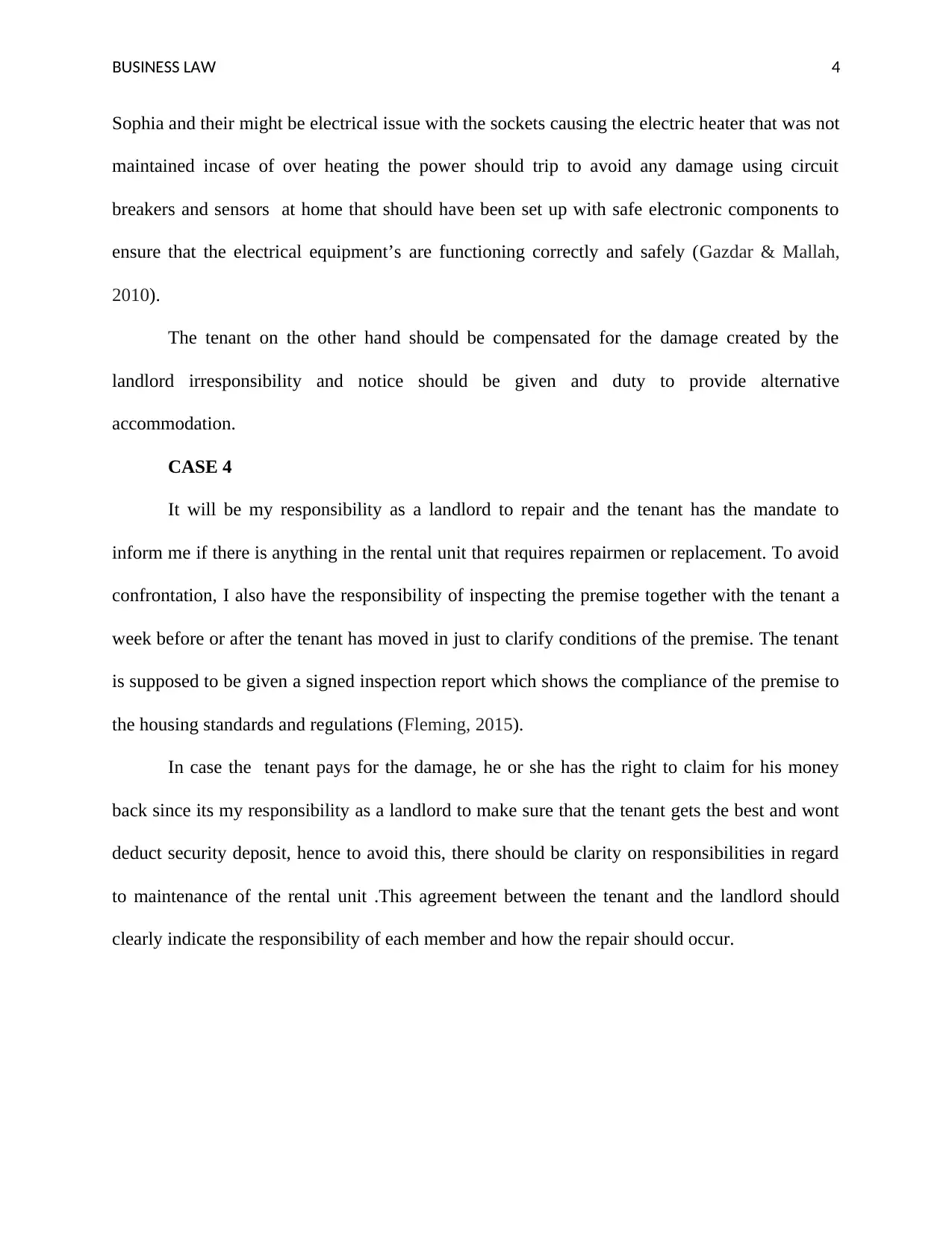
BUSINESS LAW 4
Sophia and their might be electrical issue with the sockets causing the electric heater that was not
maintained incase of over heating the power should trip to avoid any damage using circuit
breakers and sensors at home that should have been set up with safe electronic components to
ensure that the electrical equipment’s are functioning correctly and safely (Gazdar & Mallah,
2010).
The tenant on the other hand should be compensated for the damage created by the
landlord irresponsibility and notice should be given and duty to provide alternative
accommodation.
CASE 4
It will be my responsibility as a landlord to repair and the tenant has the mandate to
inform me if there is anything in the rental unit that requires repairmen or replacement. To avoid
confrontation, I also have the responsibility of inspecting the premise together with the tenant a
week before or after the tenant has moved in just to clarify conditions of the premise. The tenant
is supposed to be given a signed inspection report which shows the compliance of the premise to
the housing standards and regulations (Fleming, 2015).
In case the tenant pays for the damage, he or she has the right to claim for his money
back since its my responsibility as a landlord to make sure that the tenant gets the best and wont
deduct security deposit, hence to avoid this, there should be clarity on responsibilities in regard
to maintenance of the rental unit .This agreement between the tenant and the landlord should
clearly indicate the responsibility of each member and how the repair should occur.
Sophia and their might be electrical issue with the sockets causing the electric heater that was not
maintained incase of over heating the power should trip to avoid any damage using circuit
breakers and sensors at home that should have been set up with safe electronic components to
ensure that the electrical equipment’s are functioning correctly and safely (Gazdar & Mallah,
2010).
The tenant on the other hand should be compensated for the damage created by the
landlord irresponsibility and notice should be given and duty to provide alternative
accommodation.
CASE 4
It will be my responsibility as a landlord to repair and the tenant has the mandate to
inform me if there is anything in the rental unit that requires repairmen or replacement. To avoid
confrontation, I also have the responsibility of inspecting the premise together with the tenant a
week before or after the tenant has moved in just to clarify conditions of the premise. The tenant
is supposed to be given a signed inspection report which shows the compliance of the premise to
the housing standards and regulations (Fleming, 2015).
In case the tenant pays for the damage, he or she has the right to claim for his money
back since its my responsibility as a landlord to make sure that the tenant gets the best and wont
deduct security deposit, hence to avoid this, there should be clarity on responsibilities in regard
to maintenance of the rental unit .This agreement between the tenant and the landlord should
clearly indicate the responsibility of each member and how the repair should occur.
Paraphrase This Document
Need a fresh take? Get an instant paraphrase of this document with our AI Paraphraser
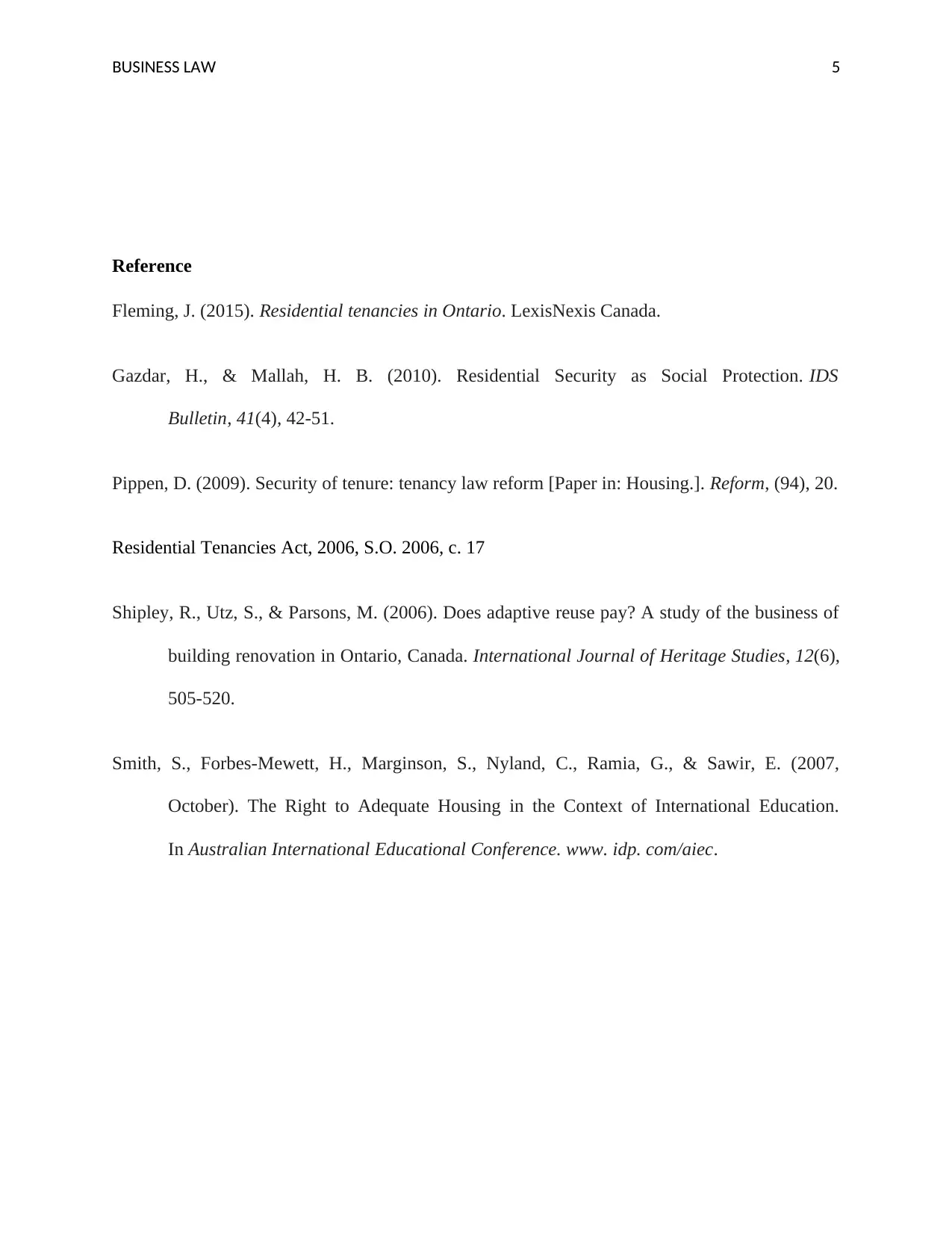
BUSINESS LAW 5
Reference
Fleming, J. (2015). Residential tenancies in Ontario. LexisNexis Canada.
Gazdar, H., & Mallah, H. B. (2010). Residential Security as Social Protection. IDS
Bulletin, 41(4), 42-51.
Pippen, D. (2009). Security of tenure: tenancy law reform [Paper in: Housing.]. Reform, (94), 20.
Residential Tenancies Act, 2006, S.O. 2006, c. 17
Shipley, R., Utz, S., & Parsons, M. (2006). Does adaptive reuse pay? A study of the business of
building renovation in Ontario, Canada. International Journal of Heritage Studies, 12(6),
505-520.
Smith, S., Forbes-Mewett, H., Marginson, S., Nyland, C., Ramia, G., & Sawir, E. (2007,
October). The Right to Adequate Housing in the Context of International Education.
In Australian International Educational Conference. www. idp. com/aiec.
Reference
Fleming, J. (2015). Residential tenancies in Ontario. LexisNexis Canada.
Gazdar, H., & Mallah, H. B. (2010). Residential Security as Social Protection. IDS
Bulletin, 41(4), 42-51.
Pippen, D. (2009). Security of tenure: tenancy law reform [Paper in: Housing.]. Reform, (94), 20.
Residential Tenancies Act, 2006, S.O. 2006, c. 17
Shipley, R., Utz, S., & Parsons, M. (2006). Does adaptive reuse pay? A study of the business of
building renovation in Ontario, Canada. International Journal of Heritage Studies, 12(6),
505-520.
Smith, S., Forbes-Mewett, H., Marginson, S., Nyland, C., Ramia, G., & Sawir, E. (2007,
October). The Right to Adequate Housing in the Context of International Education.
In Australian International Educational Conference. www. idp. com/aiec.
1 out of 5
Related Documents
Your All-in-One AI-Powered Toolkit for Academic Success.
+13062052269
info@desklib.com
Available 24*7 on WhatsApp / Email
![[object Object]](/_next/static/media/star-bottom.7253800d.svg)
Unlock your academic potential
Copyright © 2020–2026 A2Z Services. All Rights Reserved. Developed and managed by ZUCOL.





